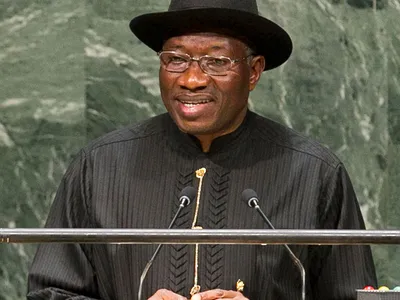Sustainability of Democracy in W/Africa Key to Solving Challenges in Region, Says Jonathan
Former President Goodluck Jonathan says sustainability of democracy in West Africa is key to resolving the challenges in the sub-region.
Jonathan made this known on Wednesday at the strategy meeting of the West African Elders Forum(WAEF), aimed at shoring up democracy and peace in the West African sub-region.
Speaking at the meeting, Jonathan, who is the Chairperson of the forum said democracy is a communal asset and it therefore requires a collective action and consensus building by all stakeholders to safeguard it.
“The fate of the West Africa democracy is been put to question by unconstitutional change of government as recently witnessed in Mali, Guinea and Burkina Faso,” Jonathan said.
The meeting will assess some of the current trends and events happening within the West African sub-region and propose a plan of action towards forestalling a further deterioration of peace and stability of the sub-region.
Jonathan called on West Africa leaders to use their diplomatic power to address the issued as well as making democracy work for the citizens of the region.
He said that the leaders must interrogate some fundamental issues such as recurring military intervention, democracy and good governance, peace and security, economic development as well as human trafficking in the sub-region.
Jonathan, who described democracy as a communal asset said it required a collective action and consensus building by all stakeholders to safeguard it.
“These sad developments which have occasioned a gradual erosion of our civic space and value system is what has necessitated this meeting today.
“Our gathering today therefore seeks to articulate possible solutions and strategies that will help consolidate our democracy.
“This is with a view to actively engaging with governments and key stakeholders to stem the tide of democratic backsliding and the breakdown of law and order in our nations.
“I am worried that some members of the sub-region are beginning to opt for military intervention because of what they consider as the weaknesses and flaws of democratically-elected leaders.
“As respected leaders, I am aware that many of you here wield great influence in our sub-region and continent.
“Together, we can leverage our experiences and the power of diplomacy to resolve the crisis in ECOWAS today,” Jonathan said.
He said that the sustainability of democracy in West Africa was key to resolving many of the sub-region challenges.
He, however, appealed to all leaders across the nations to make democracy work for the interest of all citizens.
“This is why we need to continually advocate for the strengthening of our democratic institutions. Strong institutions are the pillars for the sustenance of our democracy and the development of our nations.
“As stakeholders we must therefore, help in this regard and fashion out the best approach towards the strengthening of political systems.
“As I conclude, let me re-emphasise the point that is often made that for democracy to endure, it must yield basic public goods to its citizens. These include economic development, good social services, freedom, justice, peace and security.
“This underscores the place of good governance in our discourse of democracy. Democracy losses its meaning if it does not guarantee the economic status and social security of the citizens.
“Today, we must interrogate some fundamental issues such as recurring military intervention, democracy and good governance, peace and security, economic development as well as human trafficking in our sub-region.”
Jonathan assured that suggestions from the meeting would help consolidate the sub-region democracy and improve the state of peace and security of the continent and region.
In his remarks, former President Ernest Koroma of Sierra Leone described the meeting as timely in assessing the peace and security in the sub-region.
Koroma said that the ongoing reviews of Security protocols by African Union (AU) and ECOWAS underscored the fact that the region was experiencing challenges and reverser in the gains made over the decay.
“It is time for us us to quickly address this reversers by ensuring that we come with proposal that will address the situation.
“Our region has not been exception. We have had five coups. Three succeeded, two failed.
“I believe as elders with mandate we made known, we have a great responsibility to continue to engage to access the circumstances that have led to deteriorating situation.
“Is it a failure democracy. Is it a system failure? Is it institutional failure? Is it government failure? These are the issue that we have committed ourselves to do.”
The Executive Director, Ann Iyonu, Goodluck Jonathan Foundation, said that the challenges to peace, instability and brake down of democratic order in the West Africa sub-region must not be allowed to continue unchecked.
She said there was an urgent need for collective response to the emerging challenges in order for proactive solutions to be proffered.
“It is with this in mind that the elders have agreed to meet today to assess the current events and offer suggestions to forestall further deterioration of peace and stability of the sub-region.
“The main objectives of the meeting are to assess the recent treats and events in the sub-region.
“To articulate possible solutions to mitigate some of the challenges and forestall the further deterioration of peace and stability in the sub region.
“Adopt a programme of active ways to engage governments and key stakeholders to encourage a comprehensive response strategy that aimed to safeguard democratic gains in the last three decades.
“To work with and through ECOWAS to submit concrete policies and political proposal through the authorities of head of states and government of the sub-region,” she said.

